Azure News Digest: all announcements of the Build 2014 conference
As part of this news digest, the Microsoft Azure cloud platform brings together major announcements for developers, IT professionals and for all professionals interested in cloud technologies and the Azure platform.
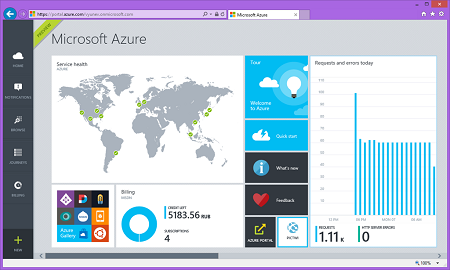
Last week, the largest Microsoft Build 2014 conference was held, in which many announcements were made, including on the Microsoft Azure platform technologies.
')
This digest contains all the announced announcements:
To start this digest is worth a small, but significant news: Microsoft Windows Azure platform is now called Microsoft Azure or just Azure. This is a landmark renaming, which reflects the openness of the platform to any technology, development languages, frameworks and tools, operating systems based on Linux and Windows Server.
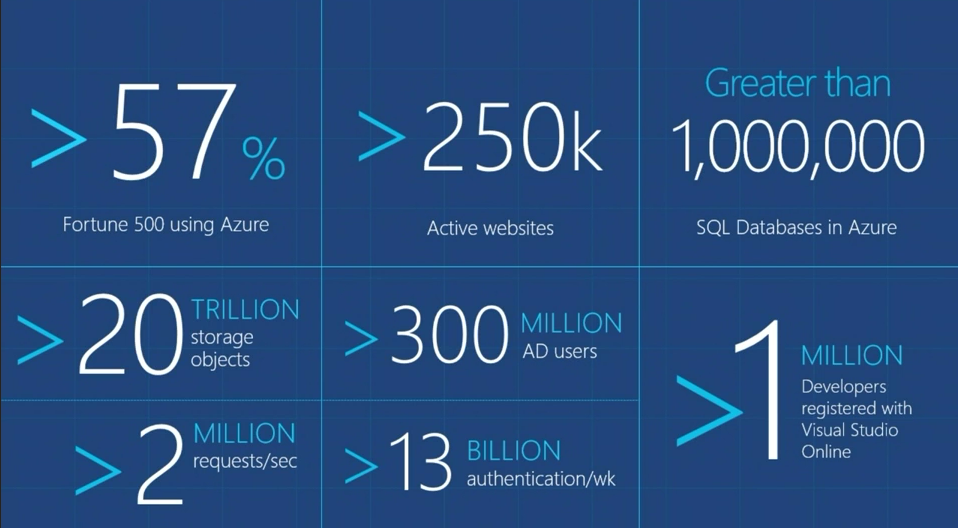
During the conference, the results of the development of the Microsoft Azure cloud platform during the year were announced. Among them:
In addition to these results, some interesting examples of modern use of Microsoft Azure were given, for example, for organizing an online broadcast of the Olympic Games on NBC Sports in the USA for hundreds of millions of viewers with a record peak of 2.1 million simultaneous connections to the HD broadcast of the USA-Canada hockey game .
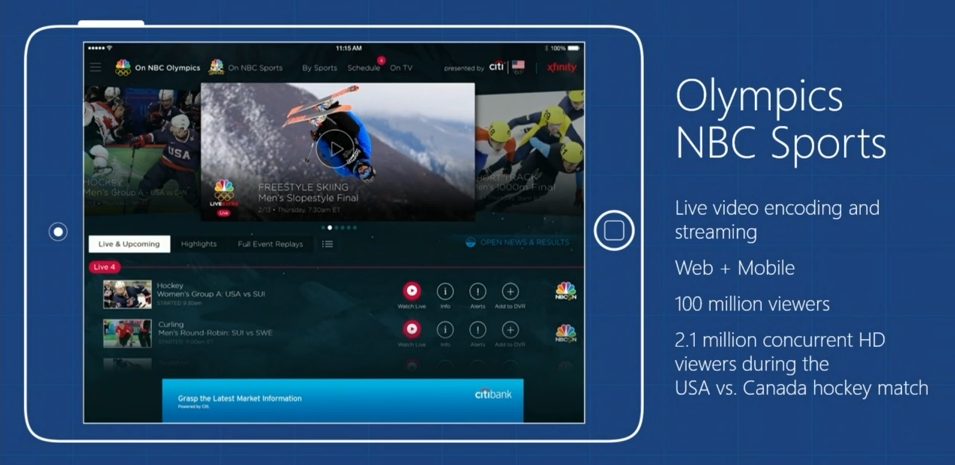

Another example - Titanfall - a popular game for Windows and Xbox, whose multiplayer mode, artificial intelligence and network functions are fully implemented on the basis of the Azure cloud. According to Microsoft, at the start of the game, a pool of 100,000 virtual machines was used, which ensured a smooth start to the game and trouble-free handling of peak interest from the players.
Azure Web Sites web application hosting service PaaS has received a number of great innovations, including useful for Java developers.
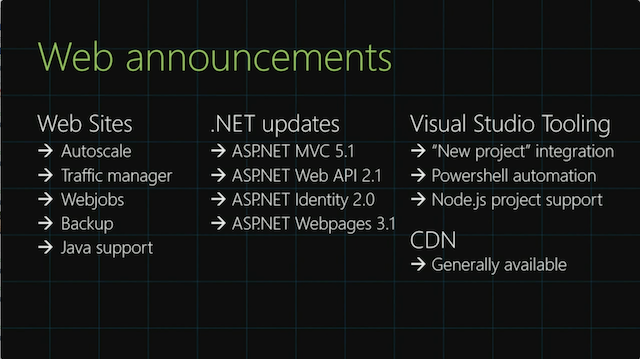
Java support . The Web Sites platform previously offered support for hosting code based on .NET, PHP, Python, and Node.JS. During the conference, it was announced that Java code would be supported .
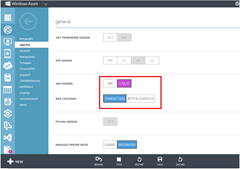
When hosted, developers can select a Tomcat or Jetty application server in the control panel. In addition, the placement of 64-bit applications that can consume a large amount of memory is supported. Details on new features and usage examples can be found at this link .
Free SSL offer . Now users of the standard Web Sites edition get a free opportunity to enable SSL mode support for their web applications. Users can count on one free IP address and 5 SNI.
Hosting plans and resource groups . Web Sites pricing has been slightly modified , a new level of Basic service has been added, which offers dedicated computing power, but costs up to 50% cheaper than the standard level due to the unavailability of a number of functionalities, such as automatic scaling. Learn more about the new pricing of Azure Web Sites on the official page . You can read more about hosting plans in this announcement .
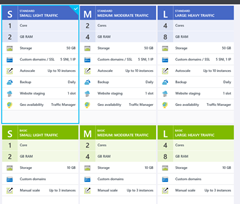

The standard website hosting plan received an update: in addition to the free SSL offer, the amount of storage space allocated for the website was increased from 10 GB to 50 GB.
In addition to new hosting plans, a new approach to combining several websites with different pricing - Resource Groups was introduced. This feature will help manage resources and allocate them in different ways for different tasks. More information about the new features can be found in this article .
Kudu update . For each website launched in Azure Web Sites there is a Kudu control panel that allows you to easily manage a number of website parameters, get diagnostic information and logs.

In the update, Kudu was introduced a new opportunity to view and manage the list of processes, load memory dumps of processes, termination of processes.
Azure Mobile Services mobile services offer the ability to organize a single backend for a wide variety of mobile platforms: iOS, Android, Windows, Windows Phone, HTML5 / JS, PhoneGap, Xamarin and others. In the framework of Build 2014 for the cloud platform announced a number of new features.
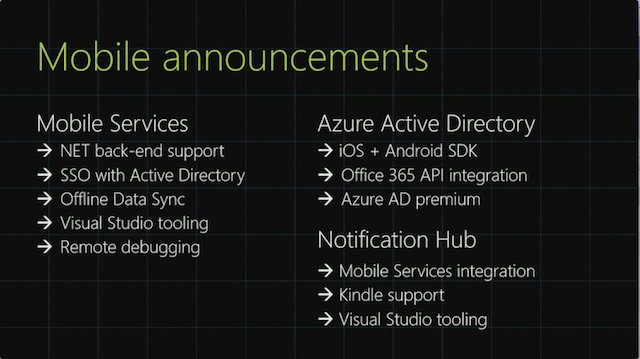
.NET as a backend . One of the most interesting announcements related to mobile services was the announcement of the opportunity to develop mobile application backend code in Azure Mobile Services in any supported .NET language.
Local and remote debugging . Together with the previous announcement, the possibility of local and remote debugging of the backend code of mobile applications is presented.
Offline data synchronization . The Azure Mobile Services backend has built-in support for offline data synchronization. Now with the help of built-in tools, developers can build applications with support for scenarios, where applications can work without connecting to the Internet with subsequent synchronization with the backend.
Kindle support . Announced support for sending push notifications to Kindle devices. Examples and detailed information is available at the following link .
The cloud relational database SQL Database available as a service received a significant portion of updates.
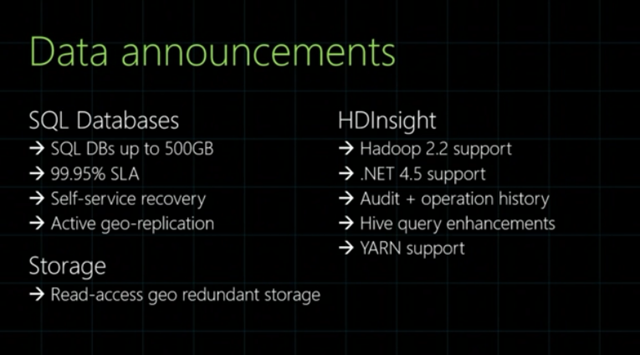
New limits and SLA . Increased the limit on the size of a single SQL Database from 150 GB to 500 GB. Together with this innovation, SQL Database Premium SLA has now been increased to 99.95%.
Automatic backups (Self-Service Restore) . The SQL Database service received support for automatic backups with the ability to accumulate up to 31 versions of the database and roll back to any of the previous saved versions.

Active Geo-Replication . The new feature of active geo-replication will allow SQL Database Premium users to automatically receive up to four active database replicas distributed throughout the world.
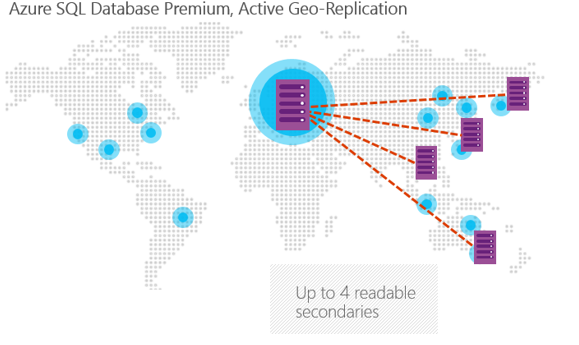
These replicas can be used for emergency switching in case of failure of one of the data centers to the results of any disaster.
One of the most pleasant and unexpected announcements of the Build conference from among the cloud has become the announcement of a new version of the portal for managing cloud capacities, billing, characteristics of web applications and services, code and other functions.
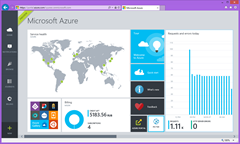
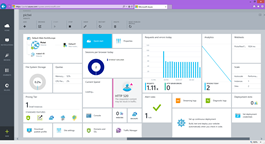
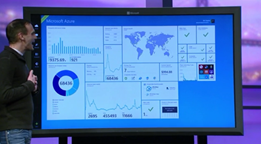
The portal is a completely new rethinking of the work with the cloud capacities of Microsoft Azure and offers a huge number of innovations, including:
You can familiarize yourself with the main features of the new portal in this short video (3 minutes). Currently, the new portal supports only Azure Web Sites, Visual Studio Online, SQL Databse and MySQL services. Support for all other parts of the Azure platform will be gradually added.

As the main announcement of the infrastructure administration in the cloud Azure was the announcement of the deep integration of two third-party tools - Puppet and Chef into workflows when creating virtual machines.
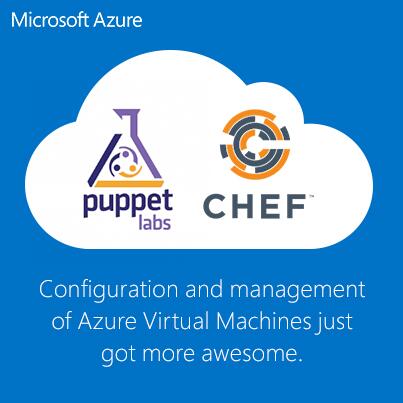

Puppet and Chef support . In collaboration with Puppet Labs and Chef, a new mechanism for managing virtual machines was introduced, closely integrated into the Azure control panel.
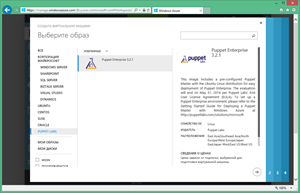
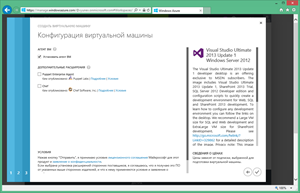
To accommodate the infrastructure with integration with Puppet, an image with Puppet Enterprise based on Linux has been added to the virtual machine gallery, after its deployment, integration of virtual machines is allowed at the creation stage. To do this, an agent is added to a virtual machine (Windows Server or Linux) that provides communication with the deployed Puppet.
For developers, the plugin Puppet Plugin for Visual Studio 2013 has also been released, which makes it easy to create and manage Puppet modules. In addition, a downloadable guide is available for developers and IT professionals.
VM Capturing . The long-awaited feature allows you to take and subsequently deploy a snapshot of a virtual machine with data disks connected to it. This feature is currently available through PowerShell commands.
New Azure Automation service . An important announcement of the Build conference was the release of a preliminary version of the Azure Automation service - a new functionality that is designed to automate the creation, deployment, monitoring and maintenance of resources in the Azure cloud using a highly scalable and reliable mechanism for executing workflows.
Developers can use the new service to automate the execution of frequently used steps, for example, deploying ready-made sets of resources. Announcement of the new service can be found here . Service description can be found on the official website . A walkthrough is available in this article .
PowerShell for Azure Resource Manager (ARM) . Instrumental support for Azure Automation is provided by a new framework based on PowerShell, which allows you to host and automatically scale cloud applications and resources. ARM is part of the Azure SDK 2.3, which is described below. More information about the use of new features for the deployment of Dev & Test environments can be found in this article .
Automatic scaling . The automatic scaling mechanism has been released into commercial operation. This service allows you to automatically scale computing resources, including virtual machines, cloud services, websites and mobile services,
New virtual networks . The function of connecting a remote desktop to a virtual network Point-To-Site VPN has been released into commercial operation (GA).
Other innovations include support for Dynamic Routing Gateway features, migrating VMs to other subnets, and the ability to configure static IP addresses for virtual machines. All of these features are available primarily through PowerShell commands.
Among other things, the Azure SDK for .NET cloud application development tools have been updated with integration into Visual Studio and new useful features.
Azure SDK for .NET 2.3 . During the Build conference, an update of Azure SDK cloud application development tools was presented with integration into Visual Studio 2013 Update 2 RC. Installing the package or updating it is available from the Web Platform Installer . Below you will find a description of some of the most notable innovations.
Web application creation wizard . Several new features have been added to the Web Application Project Wizard. First, a new web application template is introduced - Azure Mobile Service, which is designed to develop a mobile service backend API.
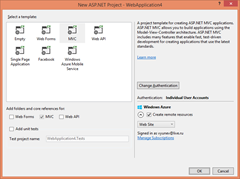
Second, the wizard added the ability to automatically create new resources for hosting a web application: an instance of Web Sites service or a virtual machine. For both options there is a function of remote debugging of a web application hosted in the cloud.
Web site management . Now from Server Explorer, you can manage not only the sites themselves, but also the application files deployed in them, as well as the application log files.
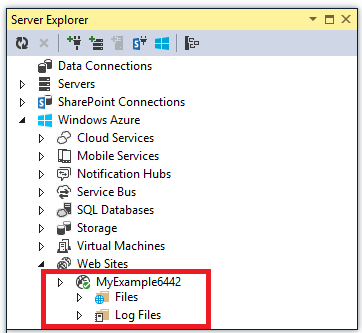
Cloud services . For testing cloud services, a new Emulator Express was introduced, which allows debugging of services without administrative privileges. In addition, remote debugging of managed and native application code is available for cloud services.
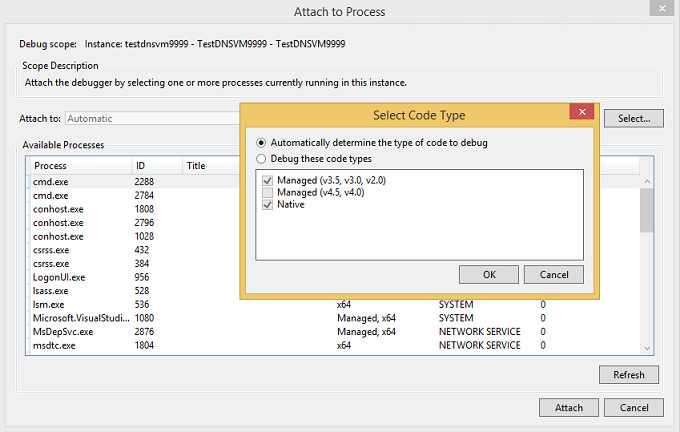
Testing push notifications . In the updated tools of Visual Studio 2013 Update 2 RC introduced a new tool to test the sending of push-notifications through the service Azure Notification Hubs.
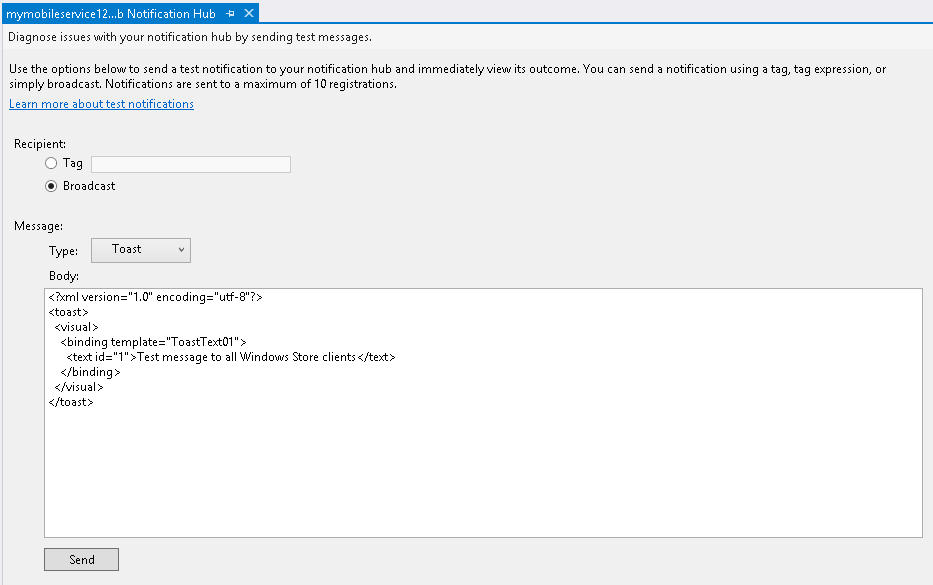
Read more about its use in this article .
Manage virtual machines . Now using Server Explorer, you can create and delete virtual machines directly from Visual Studio. A selection of machines are available from the Azure virtual machines gallery.
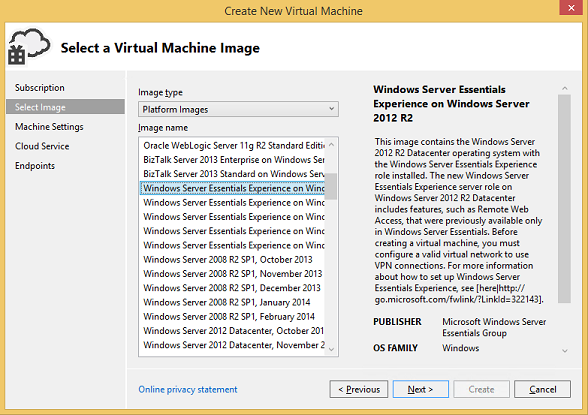
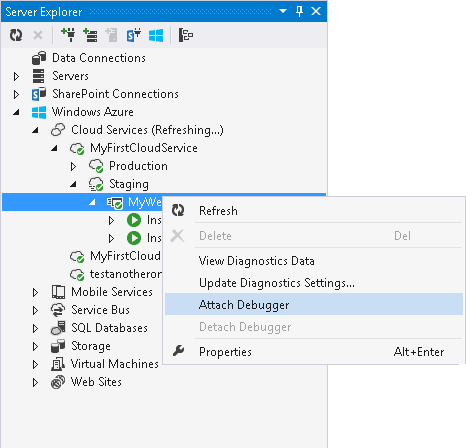
In addition, using the new features of Azure SDK 2.3 from Visual Studio, you can enable remote debugging for applications deployed in virtual machines.
The Azure CDN distributed content distribution network has received a second life and significant infrastructure update. The new version of CDN was put into commercial operation, and also became available for management through the Azure portal.
For information on locating Azure CDN nodes, see this article .
The cloud authentication system has received a number of important innovations and functions.
Azure Active Directory Premium GA . Azure Active Premium has reached commercial exploitation status.
Azure Active Directory RMS . Together with the commercial launch of Active Directory Premium, the Azure Portal Management feature was integrated into Azure Portal to manage access rights to specific content in Azure and Office 365. The details in this article .
iOS and Android SDK . SDK toolkits for working with Active Directory from iOS and Android-based mobile applications have been released.
An important announcement that sounded a few days before Build 2014 was a dramatic decline in prices for computing power and storage resources in the cloud. Along with the price reduction, a new level of virtual machines was introduced - Basic, which offers A0-A4 virtual machines at a reduced price by eliminating a number of functions that may not be used by developers, for example, automatic scaling.
As part of its promise to keep parity in prices with competitors, prices for core resources were set at Amazon prices or even lower:
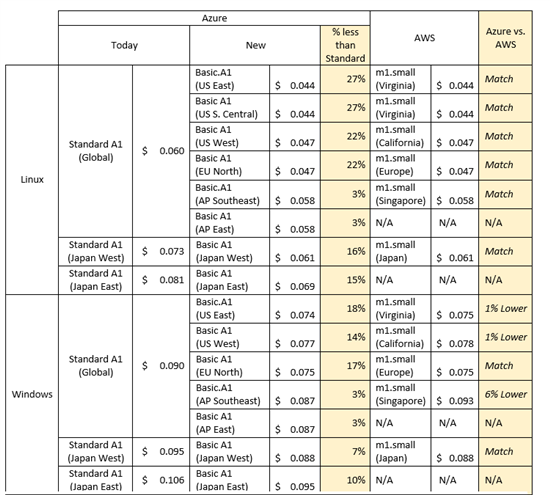
More information about changes in prices for computing capacity and storage resources, compared with Amazon can be found in this announcement .
Pricing Azure Backup . In addition to changes in prices for computing capacity and storage, prices for Azure Backup backup storage services were adjusted. New prices. which can be found on this page have been reduced from 17.33 RUB to 9.71 RUB per gigabyte over the first five gigabytes.
Availability of SQL Server 2014 in the Azure virtual machine image gallery.
Node.js Tools for Visual Studio 1.0 Beta with support for free Visual Studio 2013 Express for Web released !
Service Visual Studio Online launched into commercial operation (General Availability).
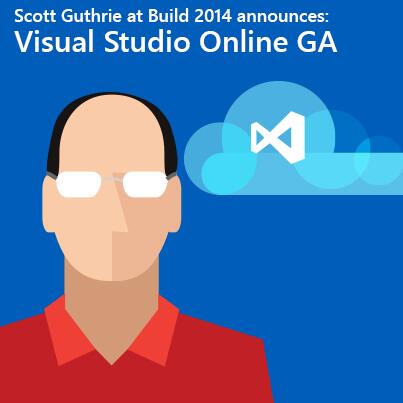
Access to the preliminary version of Application Insights has become open to all interested developers.
Launch of the .NET Foundation http://www.dotnetfoundation.org/
Roslyn compiler source code is published under the free Apache 2.0 license https://roslyn.codeplex.com/
Announcement of Smooth Streaming Plugin for OSMF with WAMS MPEG-DASH (Beta) support.

Last week, the largest Microsoft Build 2014 conference was held, in which many announcements were made, including on the Microsoft Azure platform technologies.
')
This digest contains all the announced announcements:
- Results of the development of Microsoft Azure for the year . 300 new services. Current workload and a couple of notable projects;
- Web Sites . Java support. Free SSL certificates. Hosting plans and resource groups. Kudu update
- Mobile Services . .NET languages as a backend. Remote debugging. Offline data synchronization. Kindle support.
- SQL Database . New limits and SLA. Automatic backups (Self-Service Restore). Active Geo-Replication.
- Azure portal . New management portal with the integration of Application Insights, billing and other innovations.
- Virual Machines & Networks . VM Capturing. Platform Integration with Puppet and Chef. New Azure Automation service. Auto-scale GA. New virtual networks.
- Azure CDN. Update and GA. Integration into the portal.
- Azure Active Directory. Active Directory Premium GA. Active Directory RMS features in the portal. iOS & Android SDK.
- Development tools . Azure SDK for .NET 2.3, integration with Visual Studio
- New prices . Reduced prices for computing power (up to 35%) and cloud storage (up to 65%). VM Basic level. Price reduction for Azure Backup.
To start this digest is worth a small, but significant news: Microsoft Windows Azure platform is now called Microsoft Azure or just Azure. This is a landmark renaming, which reflects the openness of the platform to any technology, development languages, frameworks and tools, operating systems based on Linux and Windows Server.
Results of the development of the Microsoft Azure platform for the year

During the conference, the results of the development of the Microsoft Azure cloud platform during the year were announced. Among them:
- Microsoft has released more than 300 new features on the platform;
- The conference announced the launch of another 44 new features. Details below;
- Recently new platform data centers were launched in China and Japan. Microsoft is the only global cloud provider that offers cloud platform services in China;
- Microsoft Azure today has already 16 public regions for placing data and code worldwide;
- Over 57% of the largest Fortune 500 companies are already using the Azure platform;
- Microsoft Azure has more than 250000 websites (Azure Web Sites) and more than a million databases (Azure SQL Database). In the Azure Storege distributed storage, users have already saved more than 20 trillion objects;
- Over a million developers have subscribed to Visual Studio Online, an Azure-based development platform that integrates with desktop development tools.
In addition to these results, some interesting examples of modern use of Microsoft Azure were given, for example, for organizing an online broadcast of the Olympic Games on NBC Sports in the USA for hundreds of millions of viewers with a record peak of 2.1 million simultaneous connections to the HD broadcast of the USA-Canada hockey game .


Another example - Titanfall - a popular game for Windows and Xbox, whose multiplayer mode, artificial intelligence and network functions are fully implemented on the basis of the Azure cloud. According to Microsoft, at the start of the game, a pool of 100,000 virtual machines was used, which ensured a smooth start to the game and trouble-free handling of peak interest from the players.
Azure Web Sites
Azure Web Sites web application hosting service PaaS has received a number of great innovations, including useful for Java developers.

Java support . The Web Sites platform previously offered support for hosting code based on .NET, PHP, Python, and Node.JS. During the conference, it was announced that Java code would be supported .

When hosted, developers can select a Tomcat or Jetty application server in the control panel. In addition, the placement of 64-bit applications that can consume a large amount of memory is supported. Details on new features and usage examples can be found at this link .
Free SSL offer . Now users of the standard Web Sites edition get a free opportunity to enable SSL mode support for their web applications. Users can count on one free IP address and 5 SNI.
Hosting plans and resource groups . Web Sites pricing has been slightly modified , a new level of Basic service has been added, which offers dedicated computing power, but costs up to 50% cheaper than the standard level due to the unavailability of a number of functionalities, such as automatic scaling. Learn more about the new pricing of Azure Web Sites on the official page . You can read more about hosting plans in this announcement .


The standard website hosting plan received an update: in addition to the free SSL offer, the amount of storage space allocated for the website was increased from 10 GB to 50 GB.
In addition to new hosting plans, a new approach to combining several websites with different pricing - Resource Groups was introduced. This feature will help manage resources and allocate them in different ways for different tasks. More information about the new features can be found in this article .
Kudu update . For each website launched in Azure Web Sites there is a Kudu control panel that allows you to easily manage a number of website parameters, get diagnostic information and logs.

In the update, Kudu was introduced a new opportunity to view and manage the list of processes, load memory dumps of processes, termination of processes.
Azure Mobile Services
Azure Mobile Services mobile services offer the ability to organize a single backend for a wide variety of mobile platforms: iOS, Android, Windows, Windows Phone, HTML5 / JS, PhoneGap, Xamarin and others. In the framework of Build 2014 for the cloud platform announced a number of new features.

.NET as a backend . One of the most interesting announcements related to mobile services was the announcement of the opportunity to develop mobile application backend code in Azure Mobile Services in any supported .NET language.
Local and remote debugging . Together with the previous announcement, the possibility of local and remote debugging of the backend code of mobile applications is presented.
Offline data synchronization . The Azure Mobile Services backend has built-in support for offline data synchronization. Now with the help of built-in tools, developers can build applications with support for scenarios, where applications can work without connecting to the Internet with subsequent synchronization with the backend.
Kindle support . Announced support for sending push notifications to Kindle devices. Examples and detailed information is available at the following link .
Azure SQL Database
The cloud relational database SQL Database available as a service received a significant portion of updates.

New limits and SLA . Increased the limit on the size of a single SQL Database from 150 GB to 500 GB. Together with this innovation, SQL Database Premium SLA has now been increased to 99.95%.
Automatic backups (Self-Service Restore) . The SQL Database service received support for automatic backups with the ability to accumulate up to 31 versions of the database and roll back to any of the previous saved versions.

Active Geo-Replication . The new feature of active geo-replication will allow SQL Database Premium users to automatically receive up to four active database replicas distributed throughout the world.

These replicas can be used for emergency switching in case of failure of one of the data centers to the results of any disaster.
New portal Azure
One of the most pleasant and unexpected announcements of the Build conference from among the cloud has become the announcement of a new version of the portal for managing cloud capacities, billing, characteristics of web applications and services, code and other functions.



The portal is a completely new rethinking of the work with the cloud capacities of Microsoft Azure and offers a huge number of innovations, including:
- scalable, customizable modern UI with touchscreen support, the concept of blades and a huge number of options for configuring the presentation of information;
- convenient and detailed work with billing, plans and expenses;
- integration with the Application Insights analytics service, viewing service data;
- integration with Visual Studio Online, online code editor, command console;
- integration and display of the state of cloud capacity around the world, integration with the notification system.
You can familiarize yourself with the main features of the new portal in this short video (3 minutes). Currently, the new portal supports only Azure Web Sites, Visual Studio Online, SQL Databse and MySQL services. Support for all other parts of the Azure platform will be gradually added.
Virtual Machines and Networks

As the main announcement of the infrastructure administration in the cloud Azure was the announcement of the deep integration of two third-party tools - Puppet and Chef into workflows when creating virtual machines.


Puppet and Chef support . In collaboration with Puppet Labs and Chef, a new mechanism for managing virtual machines was introduced, closely integrated into the Azure control panel.


To accommodate the infrastructure with integration with Puppet, an image with Puppet Enterprise based on Linux has been added to the virtual machine gallery, after its deployment, integration of virtual machines is allowed at the creation stage. To do this, an agent is added to a virtual machine (Windows Server or Linux) that provides communication with the deployed Puppet.
For developers, the plugin Puppet Plugin for Visual Studio 2013 has also been released, which makes it easy to create and manage Puppet modules. In addition, a downloadable guide is available for developers and IT professionals.
VM Capturing . The long-awaited feature allows you to take and subsequently deploy a snapshot of a virtual machine with data disks connected to it. This feature is currently available through PowerShell commands.
New Azure Automation service . An important announcement of the Build conference was the release of a preliminary version of the Azure Automation service - a new functionality that is designed to automate the creation, deployment, monitoring and maintenance of resources in the Azure cloud using a highly scalable and reliable mechanism for executing workflows.
Developers can use the new service to automate the execution of frequently used steps, for example, deploying ready-made sets of resources. Announcement of the new service can be found here . Service description can be found on the official website . A walkthrough is available in this article .
PowerShell for Azure Resource Manager (ARM) . Instrumental support for Azure Automation is provided by a new framework based on PowerShell, which allows you to host and automatically scale cloud applications and resources. ARM is part of the Azure SDK 2.3, which is described below. More information about the use of new features for the deployment of Dev & Test environments can be found in this article .
Automatic scaling . The automatic scaling mechanism has been released into commercial operation. This service allows you to automatically scale computing resources, including virtual machines, cloud services, websites and mobile services,
New virtual networks . The function of connecting a remote desktop to a virtual network Point-To-Site VPN has been released into commercial operation (GA).
Other innovations include support for Dynamic Routing Gateway features, migrating VMs to other subnets, and the ability to configure static IP addresses for virtual machines. All of these features are available primarily through PowerShell commands.
Development tools
Among other things, the Azure SDK for .NET cloud application development tools have been updated with integration into Visual Studio and new useful features.
Azure SDK for .NET 2.3 . During the Build conference, an update of Azure SDK cloud application development tools was presented with integration into Visual Studio 2013 Update 2 RC. Installing the package or updating it is available from the Web Platform Installer . Below you will find a description of some of the most notable innovations.
Web application creation wizard . Several new features have been added to the Web Application Project Wizard. First, a new web application template is introduced - Azure Mobile Service, which is designed to develop a mobile service backend API.

Second, the wizard added the ability to automatically create new resources for hosting a web application: an instance of Web Sites service or a virtual machine. For both options there is a function of remote debugging of a web application hosted in the cloud.
Web site management . Now from Server Explorer, you can manage not only the sites themselves, but also the application files deployed in them, as well as the application log files.

Cloud services . For testing cloud services, a new Emulator Express was introduced, which allows debugging of services without administrative privileges. In addition, remote debugging of managed and native application code is available for cloud services.

Testing push notifications . In the updated tools of Visual Studio 2013 Update 2 RC introduced a new tool to test the sending of push-notifications through the service Azure Notification Hubs.

Read more about its use in this article .
Manage virtual machines . Now using Server Explorer, you can create and delete virtual machines directly from Visual Studio. A selection of machines are available from the Azure virtual machines gallery.


In addition, using the new features of Azure SDK 2.3 from Visual Studio, you can enable remote debugging for applications deployed in virtual machines.
Azure CDN
The Azure CDN distributed content distribution network has received a second life and significant infrastructure update. The new version of CDN was put into commercial operation, and also became available for management through the Azure portal.
For information on locating Azure CDN nodes, see this article .
Azure Active Directory
The cloud authentication system has received a number of important innovations and functions.
Azure Active Directory Premium GA . Azure Active Premium has reached commercial exploitation status.
Azure Active Directory RMS . Together with the commercial launch of Active Directory Premium, the Azure Portal Management feature was integrated into Azure Portal to manage access rights to specific content in Azure and Office 365. The details in this article .
iOS and Android SDK . SDK toolkits for working with Active Directory from iOS and Android-based mobile applications have been released.
New prices and VM Basic level
An important announcement that sounded a few days before Build 2014 was a dramatic decline in prices for computing power and storage resources in the cloud. Along with the price reduction, a new level of virtual machines was introduced - Basic, which offers A0-A4 virtual machines at a reduced price by eliminating a number of functions that may not be used by developers, for example, automatic scaling.
As part of its promise to keep parity in prices with competitors, prices for core resources were set at Amazon prices or even lower:

More information about changes in prices for computing capacity and storage resources, compared with Amazon can be found in this announcement .
Pricing Azure Backup . In addition to changes in prices for computing capacity and storage, prices for Azure Backup backup storage services were adjusted. New prices. which can be found on this page have been reduced from 17.33 RUB to 9.71 RUB per gigabyte over the first five gigabytes.
Other news
Availability of SQL Server 2014 in the Azure virtual machine image gallery.
Node.js Tools for Visual Studio 1.0 Beta with support for free Visual Studio 2013 Express for Web released !
Service Visual Studio Online launched into commercial operation (General Availability).

Access to the preliminary version of Application Insights has become open to all interested developers.
Launch of the .NET Foundation http://www.dotnetfoundation.org/
Roslyn compiler source code is published under the free Apache 2.0 license https://roslyn.codeplex.com/
Announcement of Smooth Streaming Plugin for OSMF with WAMS MPEG-DASH (Beta) support.
Source: https://habr.com/ru/post/218565/
All Articles